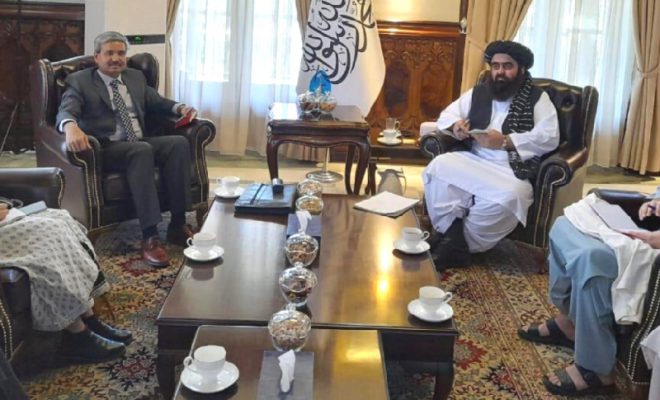Taliban officials affirm India seeks stronger ties with Afghanistan

JP Singh, holding the position of joint secretary for the Pakistan, Afghanistan, and Iran (PAI) division within the Ministry of External Affairs, recently engaged in a significant diplomatic exchange with Afghanistan’s newly appointed foreign minister, Amir Khan Muttaqi, representing the Taliban-led administration. The meeting, reported to have taken place in Kabul, signifies India’s proactive approach towards engaging with the Taliban-led government, despite not extending official recognition to the regime.
Bilateral Dialogues
The discussions between JP Singh and Amir Khan Muttaqi focused on India’s aspirations to bolster bilateral relations and expand trade cooperation with Afghanistan. Abdul Qahar Balkhi, spokesperson for the Taliban-controlled Afghanistan ministry, highlighted the multifaceted nature of the discussions, emphasizing the importance of economic collaboration, transit facilitation, and security cooperation to address challenges such as the threat posed by the Islamic State Khorasan Province (ISKP) and endemic corruption within Afghanistan’s governance structures.
India’s Economic Outreach and Chabahar Port
Abdul Qahar Balkhi’s statement underscored India’s expressed interest in deepening political and economic engagement with Afghanistan. Specifically, India reiterated its commitment to enhancing trade ties, with a notable emphasis on leveraging the strategic Chabahar Port to facilitate trade between the two nations. This indicates India’s strategic intent to harness existing infrastructure to promote economic cooperation with Afghanistan, potentially unlocking mutually beneficial opportunities for both countries.
Also Read | GOP congressman’s legislation to combat illegal immigration-related crimes surge
Facilitating Visa Issuance and Regional Stability
During the meeting, Amir Khan Muttaqi urged the Indian diplomat to streamline the visa issuance process for Afghan citizens, including businessmen, patients, and students. Additionally, discussions reportedly encompassed measures aimed at countering the illegal narcotics trade, signaling a shared interest in addressing regional security challenges and fostering stability in the broader South Asian region. These dialogues highlight India’s willingness to engage constructively with Afghanistan’s leadership to address mutual concerns and explore avenues for cooperation.
Despite India’s cautious approach towards extending formal recognition to the Taliban regime, its diplomatic engagement underscores a pragmatic recognition of ground realities and a commitment to maintaining dialogue with Afghanistan’s new leadership. This approach aligns with India’s broader strategic objectives of promoting regional stability, countering terrorism, and advancing economic development in the South Asian region.
The diplomatic exchange between JP Singh and Amir Khan Muttaqi represents a significant milestone in India’s engagement with the Taliban-led government in Afghanistan. By prioritizing discussions on strengthening bilateral relations, expanding trade cooperation, and addressing mutual security concerns, India demonstrates a pragmatic and forward-looking approach towards engaging with Afghanistan under its new leadership. Moving forward, sustained dialogue and cooperation between India and Afghanistan hold the potential to contribute to regional stability and economic development in South Asia.



